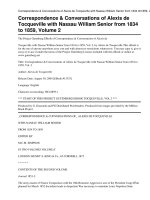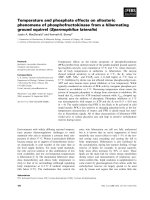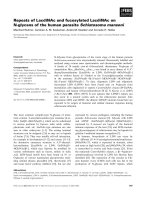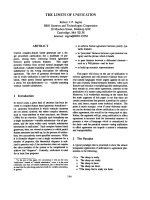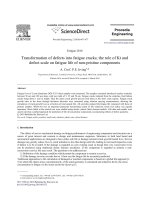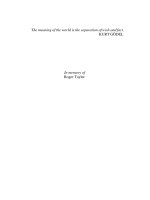The sceptical conservative disposition alexis de tocqueville and michael oakeshutt on the limits of politics
Bạn đang xem bản rút gọn của tài liệu. Xem và tải ngay bản đầy đủ của tài liệu tại đây (746.25 KB, 119 trang )
THE SCEPTICAL CONSERVATIVE DISPOSITION:
ALEXIS DE TOCQUEVILLE AND MICHAEL OAKESHOTT
ON THE LIMITS OF POLITICS
NISHANTHA DOMINIC COORAY
(B.SOC.SCI.(HONS.) NUS)
A THESIS SUBMITTED
FOR THE DEGREE OF MASTER IN SOCIAL SCIENCES
DEPARTMENT OF POLITICAL SCIENCE
NATIONAL UNIVERSITY OF SINGAPORE
2011
i
ACKNOWLEDGEMENTS
There were several times along the process of writing this thesis when I was at a loss
on how to proceed and tired at the lack of good progress. Obviously, therefore, there
are several people to whom I owe much gratitude and without whom completing this
thesis on time would not have been possible.
I am grateful to the National University of Singapore, my alma mater for seven
years, for giving me the opportunity to pursue a Masters degree under a generous
research scholarship and for being my first full-time employer.
My thesis evolved out of an interest in the writings of Alexis de Tocqueville, whom I
read for my Honours Thesis (under Dr. Kate Nicholls, whom I thank for nurturing
this initial interest). It was my supervisor, Professor Terry Nardin who first
suggested the idea of comparing Tocqueville with Michael Oakeshott. To Prof.
Nardin I owe a huge debt of gratitude for his advice and comments during the
formulation and writing of this thesis. He should not, however, be considered
responsible for any of this work’s shortcomings. Thank you, Prof, for your patience
and generosity. I owe you for helping me meet my deadlines – and I’m sorry for the
last-minute drafts I handed in! Thanks for taking it with your characteristic good
humour. I have benefitted much from getting to work with you – both on this thesis,
in the modules I have taken with you, and from interacting with you in general. I
admire your skilfulness as an academic and also your commitment to the students
you teach, and would like to develop both these qualities myself.
ii
I’m grateful to Dr. Luke O’Sullivan who pointed me to useful and interesting
material when I was hunting for a research topic two years ago. I’ve enjoyed
interacting with him as an undergraduate and working as his teaching assistant as a
graduate student. I also thank him for sharing with me Oakeshott’s notebooks.
Thank you Ms. Sham, Ms. Jaya, Ms. Angeline, Mr. Sani, Ms. Mumtaj, Ms. Lillian
and Mr.Cavin and from the Political Science General Office for always being
available when we need advice regarding academic and administrative matters. You
all have been most helpful!
I have been blessed with good friends and I know that this would have been even
harder without them. Thank you to Greg Teo for editing a portion of this thesis that I
found too difficult to edit myself. I’m grateful for my classmates, some of whom I
met as a Masters student, and a few whom I have known from my undergraduate
years. Thank you to many friends who have prayed for me; thanks also for your
company. Dear friends from Ravenahl and the Legion of Mary, our weekly
encounters are always a source of rejuvenation! Thanks, particularly Ferninda for
your perennial cheerfulness and your encouragement, especially during the last,
tiring days of writing. And thank you so very much Brigitta for your constant
prayers and care.
A million thanks to my parents. You are far away physically, but I am aware of and
deeply appreciate your unconditional support and love. You two are such a strength.
Thank you, too, my dear sister for your care and company: I don’t always express
my appreciation, but know that I’m grateful.
iii
CONTENTS
Abbreviations .......................................................................................................... iv
Summary.................................................................................................................... v
Chapter One: On Comparing Tocqueville and Oakeshott ................................... 1
Chapter Two: Scepticism in Politics ..................................................................... 21
Chapter Three: The State and its Proper Limits ................................................ 57
Chapter Four: What is Politics? ........................................................................... 79
Chapter Five: Conclusion .................................................................................... 105
Bibliography ......................................................................................................... 109
iv
ABBREVIATIONS
Works by Tocqueville
DIA
Democracy in America
OR
The Old Regime and the French Revolution
Works by Oakeshott
RP
Rationalism in Politics and Other Essays
OHC
On Human Conduct
VMES
The Vocabulary of Modern European Politics
PFPS
The Politics of Faith and the Politics of Scepticism
v
SUMMARY
Although strains of modern political thought have lost sight of the dignity and
especially the fallibility of human beings (focusing instead on social and economic
structures), the writings of Alexis de Tocqueville and Michael Oakeshott display a
strong focus on human character. This thesis argues that the insights gained from an
understanding of the human character lead both thinkers to adopt a sceptical
conservative disposition towards politics and the state. Oakeshott and Tocqueville
are pessimistic because of the pride and sensuality (the two poles between which the
human character swings) which colour politics, but also seek to protect and give
expression to the moral agency or free will that gives humankind its unique dignity.
This leads them to hold conservative attitudes both towards the state, being critical
of state actions that impose on the individuals a substantive common goal or
enterprise, and towards politics, being suspicious of attempts to rid politics of its
uncertainties by seeking to base political decisions on proof rather than on
persuasion. They warn us that when politics does not know its limits – when it aims
to be what it is not – what results are oppression and the destruction of the
reasonable hopes of countless individuals. Appreciating this sceptical conservative
disposition therefore adds some much-needed balance into the discourse and habits
of current politics.
1
ONE
ON COMPARING TOCQUEVILLE AND
OAKESHOTT
Modern politics and Western liberal democracy in particular seems to be in
crisis and the discontent with democracy has been a fruitful topic in academic
literature. Michael Sandel in Democracy’s Discontent wonders whether, at a time
when democratic ideals are spreading across the world, Americans ‘have lost
possession of them at home.’1 He identifies two core fears that reach to the core of
democracy’s discontent: fears of the loss of self-government and the loss of moral
fabric of community. These lie at the basis of other topics of national debate, like the
scope of the welfare state and the extent of rights.2 Stephen C. Craig, in a volume
titled Broken Contract, details the crisis of legitimacy that the American political
institutions – the President, Congress and the two-party system – were facing in
1996.3 This crisis has deepened over the intervening decade. Among respondents to
a 2011 Gallup Poll, 36% said that they had very little or no trust in the presidency
and 48% indicated very little or no trust in Congress (with a dismal 12% saying they
had a great deal or quite a lot of trust in the latter).4
Mark Ellingsen proposes a somewhat paradoxical analysis of the state of
democratic politics: there has been too much unrestrained optimism – occasionally
bordering on utopianism – surrounding political action. Ellingsen argues that an
Michael J. Sandel, Democracy’s Discontents: America in Search of a Public Philosophy
(Cambridge, MA: The Belknap Press, 1996), 3
2
Ibid.
3
Stephen C. Craig, ‘Change and the American Electorate’, in Broken Contract ed. Stephen
C. Craig (Boulder: WestviewPress, 1996), 6-9.
4
Jeffrey M. Jones, ‘Americans Most Confident in Military, Least in Congress.’ Gallup
Politics (June 23, 2011). Last accessed: June 12, 2012.
1
2
Augustinian realism informed the framing of the US Constitution and that present
practice and discourse neglects this realism.5 A Gallup poll conducted in 2008
showed that while trust in holders of or aspirants to political office had dropped to an
all-time low of 49%, there has been, since the 1970s, a consistently high level of
trust in ‘the American people as a whole when it comes to making judgments under
our democratic system about the issues facing our country’.6 Although optimism
seems harmless in politics it leads to serious and complex problems. The two major
results of optimism in politics and the state are the growth of state power and the
danger of totalitarianism on the one hand and the disappointment on the part of
citizens when hopes aren’t realized on the other. American politics, Ellingsen says,
has capitulated to the belief in the fundamental goodness of human nature and the
priority of the immediate gratification of individual wants over the common good.
However, when the actual dynamics of politics fail to live up to these beliefs and
when citizens do not get all that they now expect from government, they become
cynical: a ‘negative, nihilistic cynicism’. 7
One need not accept Ellingsen’s assertions to agree that political discourse
is in need of the countervailing weight of scepticism – something very different from
this cynicism – regarding both human nature and political speech and action. This
strain of political understanding once enjoyed a relatively strong presence but has
retreated, especially in the face of some strands of Enlightenment rationalism
(despite the setbacks that this rationalism has since faced). In this thesis, I argue that
Alexis de Tocqueville and Michael Oakeshott, two modern thinkers who seem
5
Mark Ellingsen, Blessed are the Cynical: How Original Sin Can Make America a Better
Place (Grand Rapids: Brazos Press, 2003) 69.
6
Frank Newport, ‘Americans’ Trust in Legislative Branch at Record Low’, Gallup
Polls(September 10, 2009). Last accessed: June 12, 2012.
7
Mark Ellingsen, Blessed are the Cynical (2003), 69.
3
dissimilar superficially, share a common sceptical conservative disposition and that
such an understanding of their work contributes to a more balanced political
discourse.
Oakeshott has been compared with several prominent philosophers,
including Plato and Aristotle, St. Augustine, Michel de Montaigne, Hegel, and
unsurprisingly, given his careful attention to the seventeenth-century thinker,
Thomas Hobbes.8 He has, however, not been studied in conjunction with another
influential political thinker: Alexis de Tocqueville. Tocqueville and Oakeshott have
indeed been placed side by side at least once: Steven M. DeLue’s chapter on
Burke’s, Tocqueville’s and Oakeshott’s ‘Conservative View’ of civil society is an
example.9 DeLue’s chapter looks at the most prominent facets of Tocqueville’s and
Oakeshott’s writings – the former’s promotion of associations of civil life and the
latter’s understanding of the state as a human association. But DeLue’s discussion
does not go deep because his aim in comparing Tocqueville and Oakeshott (and
Burke) is only to demonstrate the diversity of thought present among the
conservative views of civil society.10 Nor, though he mentions Tocqueville several
times in different writings, and each time treats him with great respect, does
Oakeshott himself give Tocqueville sustained attention.
Underlying each philosopher’s worldview, however, is a shared
understanding of the human character. Both hold that human beings possess the
unique dignity of being free moral agents and this must be protected and given
expression in our politics; yet the human character also bears several ‘faults’ which
8
See, for example, John Wendell Coats, Oakeshott and his Contemporaries: Montaigne, St.
Augustine, Hegel, et al. (Selinsgrove: Susquehanna University Press, 2000) and Debra
Candreva, The Enemies of Perfection: Oakeshott, Plato, and the Critique of Rationalism
(Lanham: Lexington Books, 2005).
9
Steven M. DeLue, Political Thinking, Political Theory, and Civil Society (Boston: Allyn
and Bacon, 1997), 234-262.
10
Ibid. 236.
4
must not be ignored when thinking about politics. In combination ,these two beliefs
lead them to adopt what this thesis calls a sceptical conservative disposition: an
attitude which accommodates both the dignity and the fallibility of humankind.11
Oakeshott and Tocqueville reject the modern tendency in politics to focus
on social and economic structures of a society at the expense of an awareness of the
intricacies of the individual and on human character. Modern politics exhibits a
considerable faith in human affairs and in the ability of politics and the state to solve
the problems that beset human society. A sensitivity to human pride and sensuality
lead Oakeshott and Tocqueville to reject this modern optimism and cause them to be
oppose attempts both to concentrate power in the state and to impose on individuals
a common substantive goal or enterprise. It also leads them to criticize efforts to rid
politics of its uncertainty by seeking a politics of proof rather than of persuasion.
The former endeavours, though perhaps born out of noble intentions (but often not),
are prideful and are bound, at best, to lead to failure. At worst they lead to
oppression and the destruction of the mundane and realistic hopes of countless
individuals who find themselves involved (willingly or unwillingly) in such projects.
By placing Oakeshott and Tocqueville side by side, this thesis aims to contribute to
the effort of introducing into the political ‘conversation’ more voices of scepticism,
thus helping counteract an excessive optimism and faith in politics.
Is Tocqueville Still Relevant?
Alexis de Tocqueville has been called a moralist, an anthropologist, a legal
historian, a philosopher, a prophet.12 His influence on the academic fields of history,
Timothy Fuller uses the term ‘skeptical conservatism’ to describe Oakeshott’s thought, but
does not offer an in-depth explanation of the label. Timothy Fuller, ‘Foreword’, Rationalism
in Politics and Other Essays (Indianapolis: Liberty Fund, 1991), xv.
11
5
and especially sociology and political science has been immense and he has left a
lasting impact on our understanding of the concepts of democracy and civil society,
freedom, equality, individualism, among others. Praise of the Frenchman has been
glowing, and he is widely considered one of the most significant of the modern
political thinkers, taking his place with Machiavelli, Hobbes and Marx. He is
considered, along with the latter, as the most important social thinker of the
nineteenth century.13 Two centuries since his birth, which was celebrated in the
United States, Italy, Belgium, Germany, Poland, and Canada, interest in
Tocqueville’s intellectual legacy is still high. Since 2000, five new English
translations of his most famous work, Democracy in America, have been published
and new translations of The Old Regime and the Revolution, his second most
important book, have appeared as well.14 One reason for the general enthusiasm and
praise of Tocqueville could be that he is so often quoted but so infrequently read in
his entirety. It could also be because what is most obvious in Tocqueville’s writing
are descriptions of concrete, practical political institutions that he believes are
necessary for freedom. These suggestions are prophetic but are not as controversial
as, say, the Hobbesian or Lockean views on human nature. The ambiguity of his
metaphysical ideas is perhaps why Tocqueville is not as divisive as these other earlymodern political writers. In the wake of his institutional suggestions, and his famous
quotes, however, a valuable aspect of Tocqueville’s writing is forgotten. Tocqueville
does express a more metaphysical understanding on human affairs than he is often
given credit for and his views on democracy and his institutional design have a
12
Whitney Pope, Alexis de Tocqueville: His Social and Political Theory (Beverly Hills:
SAGE Publications, 1986), 11-12
13
Ibid. 12.
14
Aurelian Craiutu and Sheldon Gellar, ‘Tocqueville and Us’ in Conversations with
Tocqueville, eds. Aurelian Craiutu and Sheldon Gellar (Plymouth: Lexington Books, 2009),
1.
6
deeper foundation. Unlike many other political thinkers, however, this foundation is
often not obvious, and is not the first thing the reader notices when encountering
Tocqueville’s writing.
James Abbott points out that while there was a boom in Tocqueville studies
a few decades ago with preeminent American sociologists applying Tocqueville’s
thought to contemporary American social and cultural realities, today, Tocqueville is
rarely encountered in professional sociology.15 While Abbott is commenting on the
field of sociology – and indicates that the same drought of Tocqueville references
has not occurred in political science – the reason he gives is interesting. He proposes
that since the 1960s profession sociology had ‘abandoned the very essence of the
Tocquevillian enterprise: critical analysis of democracy itself.’16 Sociologists have
turned from a critical analysis of democracy to espousing a faith in democracy
‘according to which all the ills of democracy can be solved by having more of it.’17
This approach is deeply at odds with Tocqueville’s approach to democracy.
Tocqueville is able – due partly to the trauma his family experienced during the
French Revolution and his own personal experiences as a politician, but surely also
thanks to his skills as a scholar – to maintain a critical distance from the
phenomenon of democracy. However, ‘[b]linded by faith in a particular vision of
democracy, namely egalitarian democracy, sociologists are unable to come to terms
with the corpus of Tocqueville’s works.’18 For example, it is not a given that the
increased equality found in America would lead to liberty. Even at the last line of his
book, he is ambivalent on this: ‘it depends on [the nations themselves] whether
James R. Abbott ‘Whither Tocqueville in American Sociology?’ in The American
Sociologist Vol 38:1 (2007), 61.
16
Ibid.
17
Ibid.
18
Ibid.
15
7
equality leads them to servitude or freedom, to enlightenment or barbarism, to
prosperity or misery.’19
Writing in the nineteenth century, Tocqueville observed that ‘the same
democracy reigning in American societies appeared to me to be advancing rapidly
toward power in Europe.’20 Though a preeminent writer on democracy, he was not
certain about the phenomenon he was observing. He writes of a ‘religious terror’
produced in his soul at the sign of the unrelenting march of democracy in Western
Europe and North America.21 Democracy, Tocqueville laments, has ‘been
abandoned to its savage instincts.’ What was called for was ‘To instruct democracy,
if possible to reanimate its beliefs, to purify its mores, to regulate its
movements....’22Democracy in America is aimed less at preaching democracy than
tempering and managing something that he believed was becoming an undeniable
fact of western society.
It is easy to wonder whether Tocqueville’s fears of tyranny and despotism
are relevant today. The importance of a vibrant civil society has now entered
conventional wisdom in liberal democratic countries. Freedom and human rights are
common as slogans and watchwords. However, Frederic Fransen thinks there is
cause for concern – and argues that Western Europe today ‘poses a striking
challenge to Tocqueville’s normative positions.’ This could mean either that
freedom can exist in conditions radically different from those Tocqueville proposes,
19
Alexis de Tocqueville, Democracy in America, eds. Harvey C. Mansfield and Delba
Winthrop (Chicago: The University of Chicago Press, 2000), II 4.8, 676. (DIA)
20
Ibid. Introduction, 3.
21
Ibid. 6.
22
Ibid. 7.
8
or that ‘the long-term future of liberty in Western Europe is grim.’23 Re-examining
the essence of Tocqueville therefore does have crucial implications today.
Categorizing Tocqueville
Cheryl Welch talks about Tocqueville’s timelessness: though he was born
two hundred years ago into a now extinct (and quickly waning even in his own time)
aristocracy, he seems normatively more relevant today than many of his
contemporaries.24 Tocqueville exerts a paradoxical influence on modern readers who
are both many and varied in their intellectual allegiances. The paradox, Welch points
out, is that while his writing is based on detail and context and ‘resists too great an
abstraction from that context’, such abstraction is often the prerequisite for
timelessness.25 She believes that, to understand Tocqueville, one must read his texts
in light of his ‘life and times’ and that this requirement is even more imperative for
Tocqueville than for many other thinkers. She also considers Tocqueville to be ‘less
of a general theorist of democracy’ than as a scholar of certain key issues that he
observed in his political world and that have ‘since turned out to present intractable
tensions in democratic politics and culture.’26 Certainly Tocqueville is famous for his
diagnosis of what would later turn out to be stark problems of democratic society
and politics. However, this does not mean that there was no general theory
underlying and motivating Tocqueville’s diagnosis of these issues. My aim is to
illuminate this underlying pattern that made Tocqueville write the way he did.
Frederic Fransen, ‘The Peril of Democratic Despotism in West European Democracy’ in
Conversations with Tocqueville, eds. Aurelian Craiutu and Sheldon Gellar (Plymouth:
Lexington Books, 2009), 175.
24
Cheryl Welch, De Tocqueville (Oxford: Oxford University Press, 2001), 1.
25
Ibid.
26
Ibid. 2.
23
9
A second puzzle lies in the fact that, despite Tocqueville’s pre-eminence as
a social and political theorist, a recurring theme in Tocqueville studies is the
apparent difficulty – or even impossibility – of placing the French thinker within any
of the conventional labels used to categorize political thinkers. Tocqueville has been
labelled, among others things, an apologist for the aristocracy, a conservative, a
conservative liberal, a nationalist, a conservative Marxist.27 John Lukacs finds
Tocqueville to be unclassifiable, transcending the liberal and conservative labels.28
Jack Lively argues that the very labels are artificial29. Hayden White points out
Tocqueville made contributions to both liberalism and conservatism30, which
explains why both sides adamantly claim him for themselves. Roger Boesche points
out that there is enough in Tocqueville to allow would-be allies to selectively find
evidence that would aid a particular categorization. For instance, Tocqueville had as
contemporaries and associates several of the great nineteenth century liberals such as
Pierre-Paul Royer-Collard, Victor Cousin, and John Stuart Mill and shared with
them a concern about protecting individuals from encroachments by the state.31
Harvey Mansfield and Delba Winthrop note that Tocqueville is quoted approvingly
by intellectuals and politicians on the ‘Left’ for his thoughts on community and civic
engagement and for his warnings ‘against the appearance of an industrial aristocracy
27
Whitney Pope, Alexis de Tocqueville: His Social and Political Theory (1986), 11.
J. Lukacs, ‘Alexis de Tocqueville: a historical appreciation’, Literature of Liberty 5,
(1982), 7-8 in Whitney Pope, Alexis de Tocqueville: His Social and Political Theory (1986),
11.
29
J. Lively, The Social and Political Thought of Alexis de Tocqueville (Oxford: Clarendon
Press, 1962), 8 in Whitney Pope, Alexis de Tocqueville: His Social and Political Theory
(1986), 11.
30
H. White, Metahistory: The Historical Imagination in Nineteenth Century Europe
(Baltimore: Johns Hopkins University Press, 1973), 193 in Whitney Pope, Alexis de
Tocqueville: His Social and Political Theory (1986), 11.
31
Roger Boesche, The Strange Liberalism of Alexis de Tocqueville (Ithaca: Cornell
University Press, 1987), 16.
28
10
and against the bourgeois or commercial passion for material well-being.’32 As
examples of his conservative leanings, Boesche mentions that Tocqueville was born
and remained an aristocrat (though I am unconvinced about the importance of this as
a conservative credential), his comfort in talking with royalists about his beliefs in
the dangers of equality, and his respect for tradition and religion.33 The ‘Right’ also
lauds him for his critique of ‘Big Government’ and his support of administrative
decentralization, as well as for ‘celebrating individual energy and opposing
egalitarian excess.’34 In short, it is evident, even from this briefest of surveys, that
the terms being used are neither precise nor definite enough to be useful in a
scholarly sense.
The difficulty in pinpointing where Tocqueville’s allegiances lie is
understandable. Tocqueville himself was disdainful of conventional labels, claiming
to go further than the parties35 and careful ‘not to be confounded with our ordinary
modern democrats.’36 He describes himself as a liberal; liberty is indeed his clarion
call and he expresses his ‘desire to see it carried into every political institution in my
country’.37 However, lest one is inclined to conclude that he was a liberal in the
conventional sense of the word, Tocqueville qualifies his description: “I shall be
discovered to be a liberal of a new kind’ and puts forward his ‘respect for justice, ...
sincere love of order and law [and] deliberate attachment to morality and religion’ as
features that distinguish himself from the ordinary liberal. 38 Tocqueville also did not
provide a clear and complete outline of his fundamental political convictions; he left
Harvey C. Mansfield and Delba Winthrop, DIA, ‘Editors’ Introduction’, xxiv.
Roger Boesche, The Strange Liberalism of Alexis de Tocqueville (1987), 16.
34
Harvey C. Mansfield and Delba Winthrop, ‘Editors’ Introduction’, DIA, xxiv.
35
Alexis de Tocqueville, DIA, Introduction, 15.
36
Alexis de Tocqueville, Memoir, Letters and Remains, trans. The Translator of Napolean’s
Correspondence with King Joseph (Boston: Ticknor and Fields, 1862), 381.
37
Ibid.
38
Ibid.
32
33
11
no definitive political statement and his many, strongly-held political opinions are
greatly dispersed among his writings.39 Finally, Boesche reminds us that if we are to
study Tocqueville, we cannot afford ‘the intellectual luxury of clinging to the
twentieth-century categories’ since Tocqueville himself certainly did not have this
luxury and gropes about for the terminology that best expressed the changing
political landscape around him.40
The difficulties raised in the previous paragraphs are salient ones. There is,
however, a consistency in Tocqueville’s works and it is possible to identify the
essence of his political thought. Since he certainly does not fit neatly into what is
today conventionally understood as conservative and liberal, and because these
labels do not mean today what they meant in Tocqueville’s time, merely sticking a
label on Tocqueville is not of much use. Categorization would thus have to include
precise definition of the categories proposed.
It is Tocqueville’s views on the human character that underlie his other,
more famous, views on democratic institutions and mores and give them coherence.
They also give Tocqueville the timelessness that Welch observes. Tocqueville sees
man’s dignity as an individual moral agent, capable of greatness; he also sees
evidences of man’s failings – his folly and his lust for power – in man’s political
activity. This awareness leaves Tocqueville sceptical about human affairs: man’s
capabilities often do not match up to his political ambitions. His inherent belief in
the dignity and nobility of the individual however, prevents disillusionment and
bitterness about human affairs. He is cautious, not despairing. A further contribution
of this study, then, is that the sceptical conservative disposition accommodates the
39
40
Roger Boesche, The Strange Liberalism of Alexis de Tocqueville (1987), 17.
Ibid. and Cheryl Welch, De Tocqueville (2001), 3.
12
claims of both liberals and conservatives regarding Tocqueville’s allegiance to each
camp.
What is the Conservative Disposition?
Like Tocqueville, Oakeshott has also proven to be difficult to neatly parcel
into any of the conventional categories of political ideology. He is also dismissive of
political parties, talking about the ‘unpleasing spectacle’ that is politics in general:
‘The obscurity, the muddle, the excess, the compromise, the indelible
appearance of dishonesty, the counterfeit piety, the moralism and the
immorality, the corruption, the intrigue, the negligence, the
meddlesomeness, the vanity, the self-deception...offend most of our
rational and all of our artistic sensibilities.’41
Political parties were a component of an unsavoury development of modern
European politics – the rise of the ‘anti-individual’ or the ‘mass man’ – and
contributed to the modern illusion of giving the masses choice without burdening
them with having to choose anything.42 The problem of categorization is not as
acute concerning Oakeshott as it is with Tocqueville because Oakeshott does
identify himself with a particular brand of what he calls the conservative disposition
(as opposed to Conservatism as a political party or ideological category).
When Oakeshott talks about ‘conservative conduct’ and the ‘conservative
attitude’ he does not mean Conservatism as a political ideology or political party.
His theme ‘is not a creed or a doctrine, but a disposition.’43 This is reminiscent of his
41
Michael Oakeshott, The Politics of Faith and the Politics of Scepticism, ed. Timothy
Fuller (New Haven: Yale University Press, 1996), 19. (PFPS)
42
Michael Oakeshott, ‘The Masses in Representative Democracy’ in Rationalism in Politics
and Other Essays (Indianapolis: Liberty Fund, 1991), 380. (RP)
43
Michael Oakeshott, ‘On Being Conservative’ in RP, 407.
13
understanding of practical discourse (of which political discourse is a subset) in
general:
‘In reflecting upon a response to a practical situation, or in justifying a
response proposed or made, what we bring with us is a variety of
beliefs – approvals and disapprovals, preferences and aversions, proand con- feelings (often vague) moral and prudential maxims of
varying application and importance, hopes, fears, anxieties, skill in
estimating the probably consequences of actions, and some general
beliefs about the world.’44
These beliefs can be normative, but not as a self-consistent set of principles that can
unequivocally tell us what we ought to do: ‘they often pull in different directions,
they compete with one another and cannot all be satisfied at the same time....Even to
think of them as a “creed” gives them a character they have not got.’45 Oakeshott
calls such a belief a ‘tradition’ and it is as such a ‘tradition’ that Oakeshott’s
conservatism takes shape. Tocqueville also exhibits his conservative nature in this
way. He too holds no doctrine and preaches no creed. His conservative manner must
be teased out and inferred by examining his preferences and his fears.
At its root the conservative disposition stems from an attachment to the
present and the familiar. This is different from the common assumption that
conservatism involves idolizing the past. There might be gratitude for what the past
has gifted the present, but the past is not the motivation for Oakeshott’s conservative
disposition. ‘What is esteemed is the present; and it is esteemed not on account of its
connections with a remote antiquity, nor because it is recognized to be more
Michael Oakeshott, ‘Rationalism in Politics: A Reply to Professor Raphael’ in The
Vocabulary of Modern European State, ed. Luke O’Sullivan (Exeter: Imprint Academic.
2008), 183. (VMES)
45
Ibid.
44
14
admirable than any possible alternative, but on account of its familiarity.’ 46 The
conservative also has a particular attitude towards change:
‘To be conservative...is to prefer the familiar to the unknown, to prefer
the tried to the untried, fact to mystery, the actual to the possible, the
limited to the unbounded, the near to the distant, the sufficient to the
superabundant, the convenient to the perfect, present laughter to
utopian bliss.’47
There is regret in the face of change and change always appears as a deprivation.48 A
conservative therefore must accommodate himself to change; he ‘suffers’ change.49
Contrary to the spirit of the modern times, the conservative ‘is not worried by the
absence of innovation’ because he is most fully occupied with the present. He
realises that innovation does not necessarily mean improvement and is mindful of
the problem of unintended consequences. ‘Innovating is always an equivocal
enterprise, in which gain and loss...are so closely interwoven that it is exceedingly
difficult to forecast the final up-shot: there is no such thing as an unqualified
improvement.’50 It is worth noting that Oakeshott’s conservative disposition draws a
great deal from the spirit of Michel de Montaigne: ‘I do not change easily, for fear of
losing in the change.’51 Furthermore, there is the concrete possibility of excessive
change, unequal distribution of gain and loss and the risk that gains could be off-set
by changes for the worse.52 Regardless of political rhetoric to the contrary,
Michael Oakeshott, ‘On Being Conservative’ in RP, 408.
Ibid.
48
Ibid.409.
49
Ibid.410.
50
Ibid.411.
51
Michel de Montaigne, ‘Apology for Raymond Sebond’ in The Complete Works, trans.
Donald M. Frame (New York: Knopf, 2003), 521.
52
Ibid.411.
46
47
15
humankind’s march is not always forward to ever greater heights; man’s path is, to
quote Montaigne, ‘staggering, dizzy, wobbling’.53
Contrary to popular belief, though, there is no stubborn, blanket rejection of
all change. The conservative ‘believes that the more closely an innovation resembles
growth (that is, the more clearly it is intimated in and not merely imposed upon the
situation) the less likely it is to result in a preponderance of loss.’54 Also, ‘an
innovation which is a response to some specific defect, one designed to redress some
specific disequilibrium, is more desirable than one which springs from a notion of a
generally improved condition of human circumstances, and is far more desirable
than one generated by a vision of perfection.’55 He also prefers slow changes and
calculated adjustments to rapid pace. A conservative therefore prefers small, limited
changes, made in response to contingency rather than grand innovations based on the
indefinite desire for an ever-improving condition.
The objection may be made that Oakeshott never actually calls himself a
conservative in his essay. He speaks with detachment about the ‘conservative
disposition’ and always refers to the conservative in the third person. Perhaps this is
an instance of him saying too little out of the fear of saying too much; he might be
taking pains not to be identified with a political platform. However, it would not be
too much of a stretch to conclude that Oakeshott does, in fact, identify himself with
the disposition that he takes such care in detailing. The conservative, Oakeshott says,
believes that changes in politics must be incremental corrections rather than sudden
innovation.56 A conservative also sees the proper role of government as being the
enforcement of ‘general rules of procedure upon all subjects alike....a specific and
Michel de Montaigne, ‘Of Vanity’ in The Complete Works, trans. Donald M. Frame
(2003), 895.
54
Michael Oakeshott, ‘On Being Conservative’ in RP, 411
55
Ibid. 411-412.
56
Ibid. 431
53
16
limited activity; not the management of an enterprise, but the rule of those engaged
in a great diversity of self-chosen enterprises.’57 This corresponds with Oakeshott’s
own views on government and politics. For instance, he favours the understanding of
the state as a civil association in terms of non-instrumental rules of conduct which,
unlike the rules that define an enterprise, do not promote the achievement of a
particular substantive purpose.58 Regarding change too there is an overlap between
Oakeshott’s own view and the ‘conservative disposition’: Oakeshott is very critical
of the Rationalist who falls into the error ‘of identifying the customary and the
traditional with the changeless.’59 Change must occur, but what is required is ‘a
principle of continuity: authority is diffused between past, present, and future;
between the old, the new, and what is to come.’ 60
Tocqueville also writes approvingly of tranquillity in politics. A republic,
for example, is a long-enduring institution because it is based on the ‘slow and
tranquil action of society on itself....It is a conciliating government, in which
resolutions ripen for a long time, are discussed slowly and executed only when
mature.’61 The problem, however, is that democratic nations have an almost inherent
yearning for change. Speaking of the constant evolution of the English language in
America, Tocqueville notes, ‘Even when they do not have the need to change words,
they sometimes feel the desire to do it.’62
Tocqueville’s own ascent into national politics took place in a time of great
flux: ‘Whichever way I looked, I could see nothing either solid or durable amid the
general malaise affecting the nation; everybody wanted to get rid of the Constitution,
57
Ibid. 428, 429. This aspect of the conservative disposition will be discussed at length in
Chapter Three.
58
Michael Oakeshott, ‘Talking Politics’, in RP, 454, 460.
59
Michael Oakeshott, ‘Rationalism in Politics’, in RP, 8.
60
Michael Oakeshott, ‘Political Education’, in RP, 61.
61
Alexis de Tocqueville, DIA I 2.10, 379.
62
Ibid. II 1.16, 453.
17
some through socialism, others by monarchy.’63 Though critical of the Socialists, he
was clearly not of the Conservative faction which supported the monarchy either.
Like Oakeshott, therefore, he was not of an existing Conservative Party although his
was a conservative disposition and, in practical politics, his (and his associates’)
main aim was to establish and prolong a republic ‘by governing in a methodical,
moderate, conservative and completely constitutional manner.’ In fact, Tocqueville
foresaw that this form of conservative disposition would not make him popular
among the ‘official’ conservatives: the Monarchists.64
Why be Conservative?
The motivation for Oakeshott’s and Tocqueville’s discomfort with
innovation and their distrust of ‘progressive’ programmes of change is a form of
scepticism. This scepticism too is a disposition, not a well-articulated and definitive
creed or doctrine. Indeed it would be apt to call it a personality. There are three ideas
that people often conflate: ‘scepticism, the idea that no position is demonstrable;
relativism, the idea that there is no absolute truth; and nihilism, the idea that all ideas
are of equal value.’65 A sceptic, however, need not be a relativist or a nihilist.
Oakeshott and Tocqueville are not relativists and have values which they defend
strongly. In a discussion on understanding and conduct (which will be taken up in
detail towards the end of this chapter), Oakeshott states that although human
understanding is independent from external forces, this ‘does not release his
understanding
63
from
judgement
in
which
it
may
be
pronounced
a
Alexis de Tocqueville, Recollections: The French Revolution of 1848, eds. J.P. Mayer and
A.P. Kerr, trans. George Lawrence and Danielle Salti (New Brunswick, Transaction Books,
1987), 191-192.
64
Ibid. 192.
65
Joseph Agassi and Abraham Meidan, Philosophy from a Skeptical Perspective (New
York: Cambridge, 2008), ix.
18
misunderstanding.’66 In other words, there is room for judgement and criticism of the
understanding of others. Both Oakeshott and Tocqueville take definitive stances on
several issues – they express value judgements and wish to convince others of these
judgements too. Neither does Oakeshott’s and Tocqueville’s rejection of rationalism
mean that they disparage reasoning. Oakeshott talks about ‘prudent diffidence rather
than...radical doubt.’67 Reason has a proper – and important – place in politics: it is
Rationalism itself that is unreasonable.68 In his reply to Professor Raphael defending
his criticism of rationalism, Oakeshott denies that he holds that reason is foreign to
politics. What he believes is that the reasoning apt for politics, and other forms of
practical discourse, ‘will be of a different sort of explanatory reasoning – it will be of
the sort appropriate, for example, to diagnosis, prescription and justification.’69 The
error of rationalism is that it advocates an improper and highly exaggerated faith in a
particular type of reason. Finally, on a practical level, their scepticism does not mean
that Oakeshott and Tocqueville despise political (or religious) authority. Here also,
like Montaigne, they value the authority of stable institutions and laws and the social
order that comes with traditional mores. This is also the origin of their conservatism.
Oakeshott is inspired by Michel de Montaigne in his attitude towards reason
but Tocqueville also invokes Montaigne in his discussion of ‘self-interest wellunderstood’.70 Both Tocqueville and Montaigne are pessimistic about the human
ability and desire to follow virtue for virtue’s sake and thus both recommend linking
virtue with happiness and profit, as a more effective way of promoting the former.71
Though this is admittedly not a lofty ideal, it is ‘marvellously accommodating to the
66
Michael Oakeshott, On Human Conduct (Oxford: Clarendon, 1975), 38. (OHC)
Michael Oakeshott, PFPS, 31.
68
Luke O’Sullivan, Oakeshott on History (Exeter: Imprint, 2003), 135.
69
Michael Oakeshott, ‘Rationalism in Politics: A Reply to Professor Raphael’ in VMES,
181.
70
Alexis de Tocqueville, DIA II 2.8, 501.
71
Ibid.
67



